Daily Reflection Tarot: Insights for Personal Growth
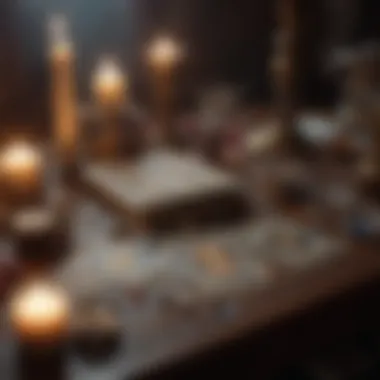
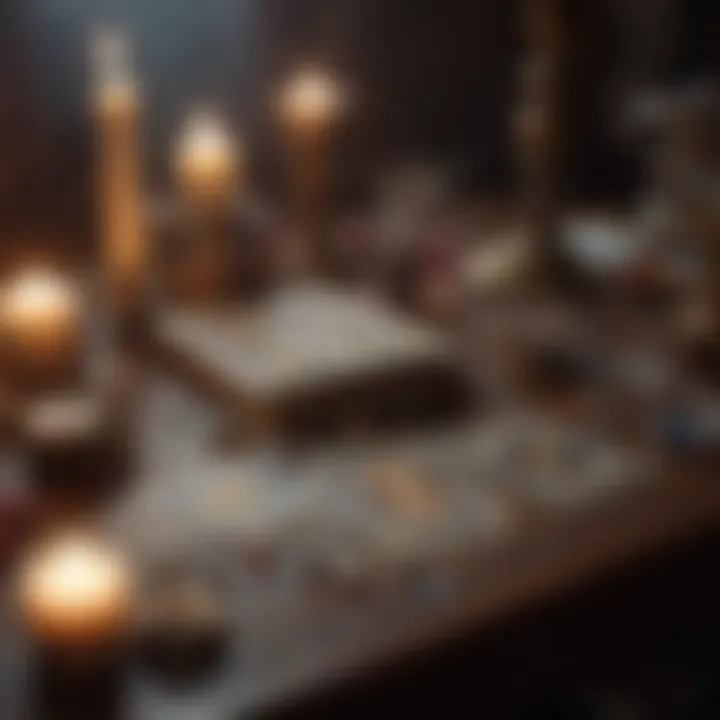
Intro
Daily reflection through tarot serves as a profound method for individuals seeking insight and personal growth. As individuals engage with their tarot cards daily, they create an opportunity for introspection and deeper understanding of their life circumstances. This practice not only enriches one’s relationship with the tarot but also enhances self-awareness and psychological well-being.
By employing structured daily spreads and interpretations, practitioners can uncover patterns, confront challenges, and recognize their strengths. The aim of this article is to present a comprehensive exploration of daily reflection through tarot, shedding light on its methods, historical significance, and transformative effects on personal development.
Astrological Concepts
Understanding astrological concepts can significantly enhance the tarot reflection practice. While tarot reads the energies and emotions surrounding us, astrology can provide context and clarity. The connections between the two fields can deepen one's insight, encouraging a holistic approach to reflection.
Definition of Key Terms
- Astrology: The study of celestial bodies' influence on human affairs. It analyzes how the positions of planets and stars relate to our behaviors and decisions.
- Zodiac: A band of the sky divided into twelve equal parts, each associated with a specific astrological sign. Every sign represents unique traits and characteristics.
- Tarot: A card system used for divination and personal reflection. Each card has symbolism and meaning that can offer insights into the querent's life.
Historical Background of Astrology
Astrology dates back thousands of years, with roots in Babylonian and Egyptian cultures. The Babylonians used astrological charts to predict seasonal changes. Later, Greeks integrated astrology into their philosophy, creating a complex system that associates the zodiac with divine influences over human affairs. The Renaissance brought astrology to Europe, intertwining science and spirituality, influencing thinkers and writers.
Overview of Different Astrology Branches
Astrology encompasses various branches, each with its distinct focus. Here are a few significant ones:
- Natal Astrology: Focuses on an individual's birth chart to interpret personality traits and potential life events.
- Mundane Astrology: Analyzes world events and their influence on nations and societies.
- Horary Astrology: Answers specific questions based on the moment the question is posed, using planetary positions.
The intersection of these astrological concepts and tarot practices lays the groundwork for better introspection. By recognizing how planets and zodiac signs can inform our experiences, tarot reflections can become more insightful.
Quote: "Astrology gives a framework that complements tarot's insights: it's a map of the sky guiding the seeker through their inner landscape."
This understanding allows practitioners of tarot to embrace a comprehensive approach. By tapping into astrological insights, one can elevate daily reflection practices to explore not just the mind but also the stars.
Preamble to Daily Reflection Tarot
Daily reflection through tarot offers a structured way to engage with oneself. It emphasizes the assimilation of insights derived from each reading and promotes a routine that nurtures personal growth. Through daily tarot practices, individuals can deepen their self-understanding and navigate life's challenges more effectively.
Understanding Tarot's Role in Self-Reflection
Tarot serves as a mirror, reflecting inner thoughts and emotions. The symbols and images on the cards can unlock memories and feelings that are often buried. By drawing cards regularly, practitioners create space for honest conversations with themselves. It is essential to view tarot not just as a divination tool but as an instrument for profound self-exploration. Each card’s meaning can resonate differently depending on the individual's context, providing a personalized insight into relevant aspects of life.
The act of reflecting on drawn cards transforms them from mere symbols into powerful catalysts for growth. This daily interaction fosters a habit of mindfulness and awareness, which can lead to enhanced emotional clarity. Practitioners can establish a deeper connection with their own psyche by diligently reflecting on what the cards convey.
The Historical Context of Tarot
To appreciate daily tarot reflection fully, it is valuable to understand the historical context of tarot. Originally, tarot emerged as a card game in the 15th century before evolving into a tool for divination and spiritual insight. The Tarot of Marseilles is one of the oldest known decks, showcasing intricate imagery that conveys meanings beyond surface appearances.
As tarot transitioned to its role in esotericism during the 18th century, different schools of thought emerged. From the Kabbalistic interpretations to astrology's intertwining influence, tarot began to encapsulate various spiritual philosophies. Understanding these origins can deepen one's interaction with the cards; it allows practitioners to honor the rich tapestry of knowledge that supports tarot practices today.
The historical significance of tarot not only enhances its symbolic meanings but also provides context for personal reflections. Each card carries the weight of centuries of interpretation, allowing for a multifaceted exploration of personal narratives.
By contemplating historical perspectives alongside personal insights, tarot practitioners can elevate their reflective practice, resulting in a more enriching experience.
The Mechanics of Daily Tarot Reflection
Daily tarot reflection serves as a bridge between our internal thoughts and the wisdom that the tarot cards offer. Understanding the mechanics of this practice is essential for establishing a meaningful relationship with the cards. Engaging with tarot daily allows individuals to develop insights into their emotions and experiences. It transforms abstract thoughts into tangible reflections, promoting self-awareness and emotional growth. The methods employed within daily reflection not only vary but also each offers unique benefits tailored to individual needs.
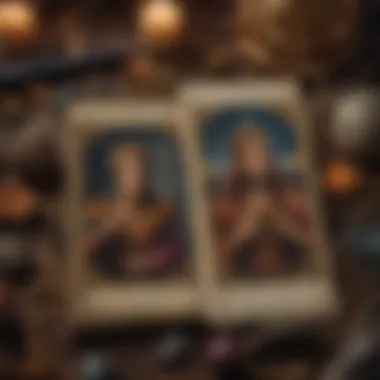
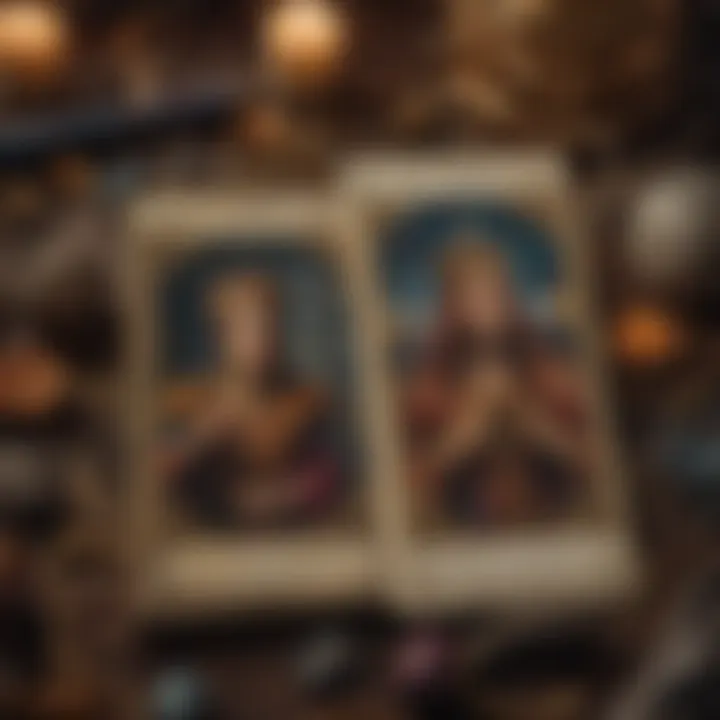
Choosing the Right Deck for Reflection
Selecting the appropriate tarot deck plays a critical role in the daily reflection process. Personal resonance with a deck can enhance the reading experience. Each deck possesses distinct artwork and interpretations that might appeal to different individuals. A well-chosen deck aligns with one's intuition, facilitating a smoother connection to the cards. For some, a traditional Rider-Waite deck may serve best due to its widely recognized imagery. Others may find more identity in decks that reflect their personal values or aesthetics, such as the Wild Unknown or Prisma Visions. Ultimately, the right deck is one that speaks to you, encouraging engagement and reflections.
Preparing for a Daily Tarot Practice
Establishing a routine around tarot practice creates a framework that promotes consistent self-reflection.
Creating a Dedicated Space
Creating a dedicated space for tarot reflection can significantly enhance this practice. This space should be free from distractions, allowing for deep contemplation. A well-arranged area fosters a calming environment, which encourages clearer thinking. Essential characteristics of this space may include soft lighting, comfortable seating, and access to personal items that hold meaning, such as crystals or candles. The unique feature of this dedicated space is that it becomes a sacred zone for personal interaction with the tarot, heightening focus and intention.
Setting Intentions Before Reading
Setting intentions before reading the cards is another key component of an effective daily practice. This pre-reading ritual helps to clarify what one hopes to gain from the session. The primary characteristic here is the establishment of clarity and purpose, which is essential for a focused reading. Formulating intentions can include questions about personal issues or areas that require insight. This practice is beneficial as it aligns the reader’s energy with the cards, potentially yielding deeper meanings. Taking the time to set clear intentions ensures that the reading process remains centered on personal growth and awareness.
Types of Daily Spreads
The choice of daily spreads can greatly affect the insights and reflections drawn from tarot.
Single Card Draw
The single card draw is one of the simplest methods for daily reflection. This technique allows for quick insights and can be completed in a matter of minutes. The beauty of this spread lies in its simplicity, making it a popular choice for beginners or those with limited time. It offers a focused reflection on a specific question or mindset for the day. However, it may not provide as much depth in complex situations compared to larger spreads.
Three-Card Spread
The three-card spread is another effective method, providing a more comprehensive view. This spread typically represents past, present, and future influences on a person’s life. It dynamically connects the individual's experiences with actionable insights. This method combines depth with simplicity and appeals to a wider audience. However, some may find the interpretation of three cards slightly more challenging than a single card, requiring deeper analytical skills.
Past-Present-Future Spread
The past-present-future spread gives a clearer timeline of influences. Each card drawn represents a distinct point in time, facilitating a broader perspective on issues. This structure allows for detailed introspection and is particularly valuable for those navigating transitions. The unique feature is its temporal alignment of insights, but it can be intricate to interpret as it necessitates connecting different elements thoughtfully.
Daily tarot reflection not only guides you but also reveals the underlying layers of your consciousness.
Engaging in daily tarot reflection through various mechanics encourages a sturdy foundation for personal growth. Each method has specific uses and results, making it crucial to select practices that align with individual needs and preferences.
Interpreting Tarot Cards for Daily Insights
Interpreting tarot cards in the context of daily insights is an essential component of any tarot reflection practice. The act of drawing cards can serve as a mirror, reflecting the inner workings of one's mind and emotions. Each card has its own symbolism and meaning, which can reveal layers of personal truth when examined closely. Understanding the nuances of card interpretation can greatly enhance a practitioner’s reflection process, making it more transformative and insightful.
Effective interpretation allows for deeper self-exploration and can help identify patterns in thoughts, behaviors, and life circumstances. This section will explore the foundational elements of tarot interpretation, including basic meanings, developing personal interpretations, and addressing the unique aspect of reversed cards.
Basic Card Meanings
A solid grasp of basic card meanings is crucial for anyone engaging in tarot. Each card has a repertoire of traditional meanings and interpretations that provide context for the reflection process. Understanding these basics enables you to engage with the cards more meaningfully.
Some important aspects of basic card meanings include:
- Suits and Symbols: Each suit—Cups, Wands, Swords, and Pentacles—relates to different areas of life such as emotions, actions, thoughts, and material aspects.
- Major and Minor Arcana: Major Arcana cards often signify larger life themes and spiritual lessons, while Minor Arcana cards reflect day-to-day experiences.
- Numerical Significance: The number on a card can add another layer of meaning. For instance, the number three may indicate growth, collaboration, or creativity.
Becoming familiar with these components allows you to draw connections between the cards and your personal experiences or dilemmas.
Developing Personal Interpretations
Once you have a foundation in the basic meanings of the cards, personal interpretation becomes the next step. This process is highly individualized and can significantly vary from one person to another.
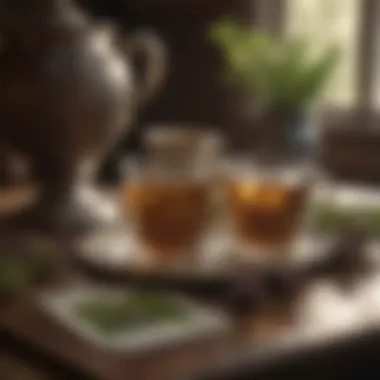
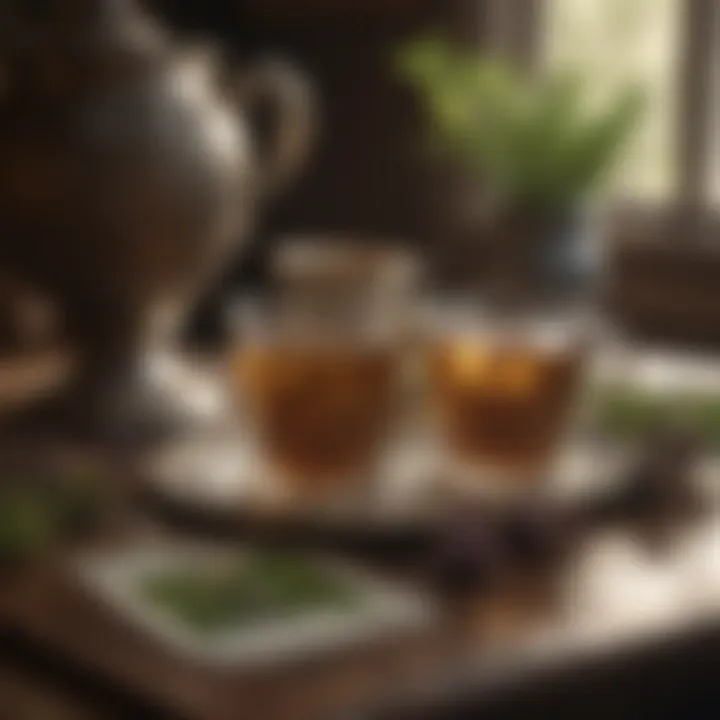
To develop personal interpretations, you can consider the following approaches:
- Contextual Relevance: Reflect on how the card relates to your current situation or emotional state. Ask yourself what the card stirs within you or highlights in your life.
- Intuitive Responses: Pay attention to your gut feelings when you look at a card. Your subconscious may draw connections that are not immediately apparent.
- Personal Journals: Keeping a journal dedicated to your tarot reflections can help track associations and recurring themes that develop over time.
By engaging in these practices, you allow your relationship with the cards to deepen. This fosters clarity on complex feelings or scenarios emerging in your life.
Utilizing Reversed Cards
Reversed cards often add an additional layer of complexity to tarot interpretation. When a card is drawn upside-down, the meaning typically shifts, indicating misalignment, blockage, or an inner struggle.
Here are some key points for utilizing reversed cards:
- Flipped Meanings: Reversed cards can signal that the energy associated with the upright meaning is either suppressed or misdirected. For example, an upright Five of Cups may indicate loss, while its reverse could suggest moving forward from grief.
- Shadow Aspects: These cards may reveal shadow aspects of your psyche. It encourages introspection about what you may be avoiding or resisting.
- Growth and Learning: Instead of viewing reversed cards as negative elements, they can signify learning opportunities. They challenge you to confront and resolve underlying issues.
Understanding the implications of reversed cards can lead to a more nuanced and thorough reflection.
The Psychological Benefits of Daily Reflection with Tarot
Daily reflection through tarot practice offers profound psychological advantages. These benefits promote a deeper understanding of oneself and enhance emotional health. Engaging with tarot can serve as a tool for introspection, leading to insights that illuminate personal challenges and pathways for growth. Individuals interested in self-discovery may find that daily tarot reflection becomes not just a ritual, but an integral part of their mental and emotional well-being.
Enhancing Self-Awareness
Self-awareness is fundamental to personal development. Through daily tarot reflection, individuals can tap into themes that emerge, revealing patterns in thoughts and behaviors. Each card drawn can represent aspects of the self that might be overlooked. This conscious engagement invites one to ask questions like, "What does this card reflect about my current state?" or "How can I use this insight to inform my decisions?"
The act of interpreting cards encourages dialogue within oneself. One may discover hidden motivations or biases. This increased clarity about personal habits and emotions fosters a more authentic life, as individuals begin to recognize their true desires and aspirations.
Encouraging Emotional Processing
The tarot is not simply a tool for divination; it serves as a medium for emotional exploration. Each card can symbolize feelings or situations that require resolution. This aspect of tarot reflection invites users to confront emotions that may otherwise go unaddressed. For example, drawing the Tower card may prompt consideration of recent upheaval in one's life and open avenues for discussion regarding fears and anxieties.
By regularly engaging in this practice, individuals can cultivate the ability to articulate and process complex feelings. This realization leads to an establishment of healthier emotional habits, as users learn to acknowledge and integrate their emotional experiences into their daily living.
Fostering Mindfulness and Presence
Mindfulness is the practice of being fully present. When one engages in daily tarot reflection, it creates an opportunity to slow down and focus. The artifacts of daily life often pull attention away from inner thoughts or feelings. Tarot assists in shifting focus back to oneself by creating a dedicated moment for reflection.
During a reading, one can become attuned to sensations, emotions, and thoughts that arise, reinforcing the practice of mindfulness. This awareness not only aids in tarot interpretation, but also enriches day-to-day interactions, allowing individuals to navigate challenges with composure.
By embracing the psychological benefits of daily tarot reflection, individuals build a stronger foundation for self-growth, emotional resilience, and a consistent practice of mindfulness.
In summary, daily tarot reflection can significantly enhance self-awareness, promote emotional processing, and cultivate mindfulness. Users of tarot not only engage with the symbols of the cards but also with the underlying currents of their lives. This integration is key to leveraging tarot as a psychological tool for substantial personal development.
Integrating Daily Reflection into a Broader Spiritual Practice
Daily reflection with tarot can significantly enhance one's spiritual path. By integrating this practice into a broader spiritual framework, individuals can deepen their insights and cultivate a richer inner life. Through daily introspection, tarot becomes not only a tool for reflection but also a catalyst for spiritual growth.
Combining Tarot with Meditation
Combining tarot with meditation can provide a profound approach to self-exploration. Before starting a tarot reading, taking a moment for meditation allows one to clear the mind and set a more intentional atmosphere for understanding the cards.
- Calm Your Mind: Begin with a few minutes of quiet breathing. This reduces distractions and prepares the mind for clarity.
- Set Your Intent: Decide what you want to focus on during your reading. Be specific about the insights you wish to gain.
- Incorporate Cards: After meditating, draw your cards and reflect upon them. Notice any emotions or thoughts that arise during this process.
Utilizing this combined approach offers a more open channel for receiving guidance from the tarot.
Journaling alongside Tarot Insights
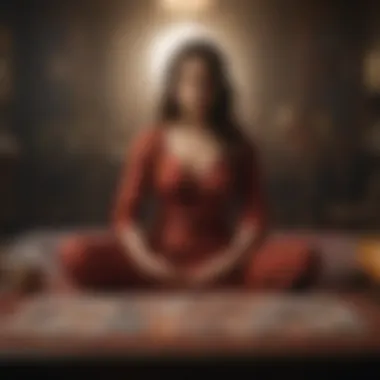

Journaling together with tarot insights promotes deeper understanding and retention of lessons learned. This method encourages individuals to articulate their thoughts, emotions, and interpretations into words.
- Document Your Spread: Record the cards drawn, their positions, and initial thoughts about their meanings. This creates a reference to review later.
- Reflect on Personal Relevance: Write down how the messages from the cards relate to current life situations and feelings. This can solidify insights gained.
- Track Progress Over Time: Create a habit of revisiting past entries to observe patterns and personal growth through tarot reflections.
This practice can enhance clarity and offer tangible evidence of spiritual development.
Incorporating Tarot into Daily Rituals
Incorporating tarot into daily rituals creates a structured way to engage with spiritual practices. Routine rituals lend a sense of normalcy and reverence, making reflection an integral part of daily life.
- Morning Rituals: Start the day by pulling a card for guidance. This sets a reflective tone for the day ahead.
- Evening Reflection: Examine the day's events in light of the chosen card. Consider how the wisdom of the card applies to the day's experiences.
- Special Occasions: Use tarot during significant events, like full moons or personal milestones, to gain deeper insights about transitions in life.
Incorporating tarot rituals into daily life fosters an environment for ongoing spiritual exploration.
Integrating tarot reflection within a broader spiritual practice illuminates new pathways for personal growth. Each nuance unveiled can serve to enhance understanding and awareness, leading to a more enriched spiritual experience.
Common Challenges in Daily Tarot Reflection
Daily tarot reflection offers numerous benefits, yet it also presents certain challenges that practitioners must navigate. Understanding these challenges is vital for anyone looking to make the most of their tarot practice. Recognizing how to manage expectations, overcome confusion in interpretation, and maintain consistency in practice can significantly enhance one’s experience with tarot as a tool for self-discovery and insight.
Managing Expectations and Experiences
When engaging in daily tarot reflection, it is crucial to set realistic expectations. Many people might anticipate profound insights or immediate transformations from every reading. However, tarot is more of a tool for reflection and self-awareness rather than a guaranteed source of answers.
- Emphasis on Process: The significance lies in the journey—not merely the destination. It’s beneficial to approach each card drawn as a moment for contemplation rather than a definitive directive.
- Allowing Natural Growth: Insights from tarot may not always present themselves immediately. Over time, themes will emerge as patterns within one’s life.
- Accepting Diverse Outcomes: Every reading may yield different results, including feelings of uncertainty or confusion. It’s essential to acknowledge these experiences as part of the reflection process.
Creating a mindset to accept these variations can reduce stress and promote a healthier relationship with tarot.
Overcoming Interpretation Confusion
Interpretation is a key component of tarot reflection. However, many practitioners face confusion, particularly when cards have multiple meanings. Each card holds unique messages that often change depending on the context.
- Understanding Card Meanings: Familiarity with basic interpretations is a starting point. Yet, one's personal connection to the cards can alter these meanings. Developing this relationship can lead to deeper insights.
- Keeping a Reference Guide: Having a tarot guidebook or reference material can assist in clarifying meanings. This can help bridge gaps during confusing readings.
- Engaging with Community: Discussing interpretations in online forums like reddit.com or local tarot groups puede provide additional perspectives. Shared insights can illuminate meanings that may not resonate at first glance.
Building a confident interpretation practice is often a gradual process filled with trial and error.
Maintaining Consistency in Practice
Consistency is a cornerstone of effective daily tarot reflection. Yet, establishing a routine can be challenging. Life's demands often interfere, leading to sporadic practices that yield limited insights.
- Designating Time Each Day: Allocating a specific time for tarot reading can instill a sense of discipline. Consistency can transform tarot into a meaningful daily ritual.
- Creating an Accessible Space: Setting up a designated space for tarot practice can encourage regular engagement. This space should feel inviting and inspiring, making it a refuge for contemplation.
- Utilizing a Calendar or Journal: Tracking daily readings in a journal can motivate consistency. It provides not only records of previous insights but also encourages reflection upon progress over time.
By taking these steps to ensure a consistent practice, tarot can evolve into a more enriching and insightful experience, ultimately supporting personal growth.
Effective daily tarot reflection requires navigating common challenges. Understanding these obstacles can enhance the overall experience, leading to greater self-awareness and insight.
Epilogue: Embracing Daily Tarot Reflection as a Tool for Growth
In the journey of self-discovery and personal development, daily tarot reflection offers a structured yet flexible approach to introspection. This practice enables individuals to engage with their inner thoughts and emotions in a meaningful way, allowing for a deeper understanding of oneself. With tarot's imagery and symbolism, one can uncover latent insights that may otherwise remain hidden.
By incorporating tarot into a daily routine, practitioners can experience numerous benefits. First, this ritual promotes self-awareness, fostering a clearer understanding of personal motivations and behaviors. Second, it encourages emotional processing, enabling individuals to confront unresolved feelings and thoughts. Third, tarot serves as a powerful tool for mindfulness, guiding users to remain present and attentive to their reflections.
“Daily tarot reflection is not just about fortune-telling; it’s about cultivating a dialogue with oneself.”
To truly embrace the potential of tarot for growth, one must approach the practice with intention and patience. Setting clear goals for each reading can enhance the relevance of the insights gained. Moreover, recognizing that interpretation takes time and experience can alleviate the pressure of immediate clarity.
A few considerations include:
- Consistency: Developing a regular practice helps to build familiarity with the deck and strengthens interpretive skills.
- Journaling: Recording reflections can track progress over time, helping users identify patterns and changes in thoughts or emotions.
- Integration: Combining tarot with other reflective practices such as meditation or journaling can amplify its benefits.
By engaging with daily reflection through tarot, individuals invite growth and transformation into their lives. They can unveil hidden aspects of their psyche, confront challenges, and celebrate personal achievements. Ultimately, this practice empowers people to navigate their journey with greater confidence and understanding, making it a meaningful companion on the road to self-realization.







